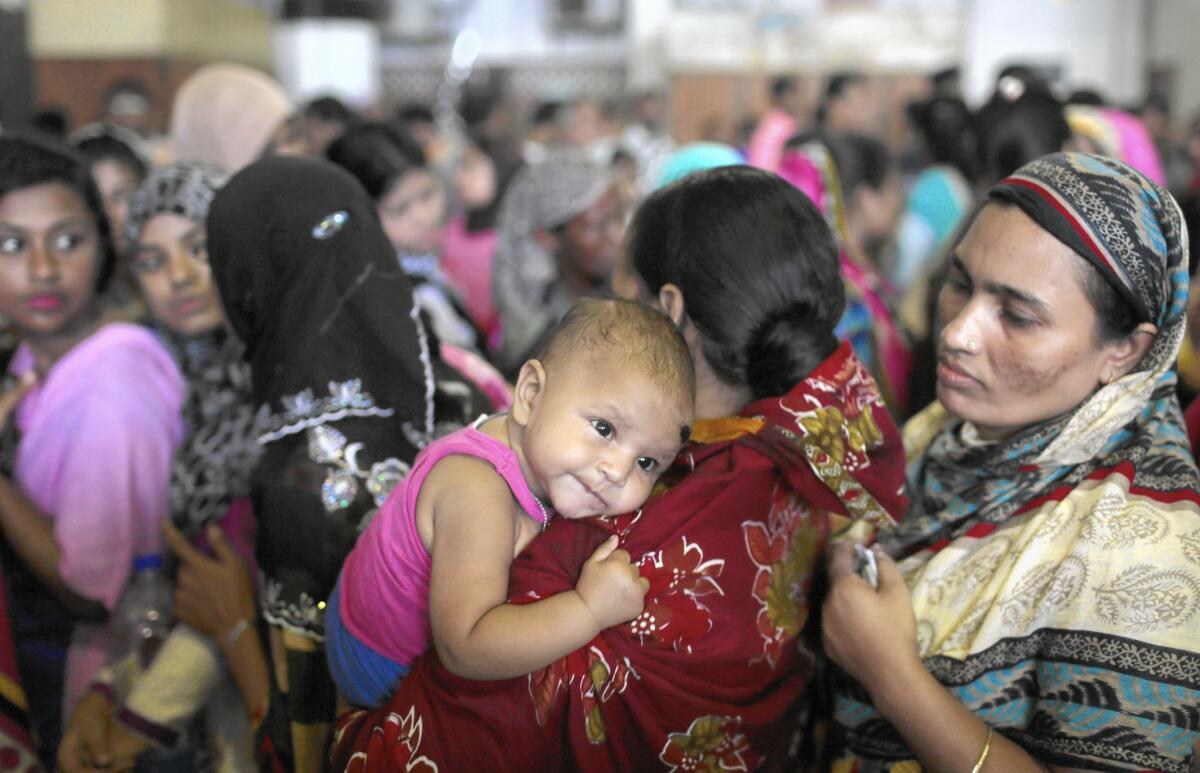Leaders aim for sustainable development after Millennium goals success

- Share via
Reporting from Washington — After a decade of dramatic global health and economic advances, world leaders are set to adopt a sweeping agenda to eradicate extreme poverty and child mortality and spur efforts to slow climate change and preserve the environment.
The so-called Sustainable Development Goals — expected to be formally approved at the United Nations this week at the largest-ever gathering of heads of state, including President Obama — have garnered little attention in the United States.
But they are being closely watched around the world as a blueprint that could build on an unexpectedly successful global campaign to improve health in the developing world over the last 15 years. The effort has, among other things, reduced child deaths.
“This is a very important moment,” said Tony Pipa, who is leading the Obama administration’s work on the global initiative. “Leaders of the world are coming together to end extreme poverty and do it in a way that is sustainable.... It’s extraordinary.”
Pope Francis, who has made inequality and climate change central issues for his papacy, is scheduled to open the summit Friday. Obama is to address the gathering at the U.N. on Sunday.
Still unclear is whether the 17 new goals can galvanize action and investment. Critics charge that the objectives — and a subset of 169 more specific targets — are unfocused and hopelessly utopian, ignoring political realities.
Global leaders are pledging to, among other things, “end hunger,” “make cities and human settlements inclusive, safe, resilient and sustainable” and “conserve and sustainably use the oceans,” all by 2030.
Also uncertain is whether the broader goals, such as those touching on climate change and environmental policy, will engage wealthy nations, particularly the U.S., as did earlier efforts to reduce child mortality and HIV/AIDS infections in the developing world.
“The U.S. is always the country where you feel that this is least likely,” said Andrew Norton, director of the London-based International Institute for Environment and Development. “There is this deep sense that multilateral institutions don’t bear on U.S. domestic policy.”
Unlike many previous U.N. efforts, however, the new initiative builds on what some consider the most successful global anti-poverty and public health campaign in history, an effort known as the Millennium Development Goals.
Since 1990, the number of people worldwide in extreme poverty, defined as living on less than $1.25 a day, has fallen from nearly 2 billion to about 1 billion, according to World Bank estimates. At the same time, major health advances have dramatically reduced child mortality and extended life expectancies worldwide.
In the last 25 years, the number of children dying each year before their fifth birthday has declined from nearly 13 million to less than 6 million, a recent U.N. report showed.
And though progress has lagged in some countries, two dozen developing nations, including Ethiopia, Bangladesh, Cambodia and Yemen, reduced mortality rates for young children by more than two-thirds, the target set in the Millennium Development Goals.
Many factors explain the gains, including rapid economic growth in China, Southeast Asia and sub-Saharan Africa.
But many experts also credit the global goals.
“It’s easy to be skeptical about these U.N. goals and targets,” said Dr. Robert Black, a global health authority at the Johns Hopkins Bloomberg School of Public Health. “But they did really galvanize political will and funding.... The fact that some poor countries have met the two-thirds reduction [in child mortality] is quite astonishing.”
The 2030 agenda is substantially more ambitious than the Millennium Development Goals.
Rather than simply reducing extreme poverty and child mortality, for example, countries are now pledging to eliminate them altogether (although, as with the previous goals, there is no penalty for missing the mark).
At the same time, the new goals include many more environmental targets that link economic development and health to preserving water resources and habitats, cutting waste and slowing global warming.
Many of these targets probably will require difficult trade-offs and more political will in many countries, including the United States.
The added complexity reflects how interconnected the world’s challenges are, said Susan Brown, who oversees global policy at World Wildlife Fund International, one of legions of nongovernmental organizations that have rallied behind the new goals.
“There isn’t a nice, simple solution to the mess we are in,” Brown said. “But governments are used to making trade-offs all the time.... They can choose to develop in certain ways.”
Bjorn Lomborg, a Danish economist who has criticized the new goals as overly broad, said a narrower approach would guarantee better results. “Every dollar would go so much further,” he said. “I’m afraid we are wasting a generational opportunity here.”
Lomborg and a group of leading economists are advocating 19 specific targets, such as phasing out government subsidies for fossil fuels and halving malaria infections by 2030, in place of the 169 in the Sustainable Development Goals.
A more focused approach would also be more affordable, especially at a time when international aid budgets, including in the U.S., are tightening.
U.S. development spending on global health, which nearly doubled between 2006 and 2010 to $10 billion, has remained flat since, according to data gathered by the nonprofit Kaiser Family Foundation.
In Washington, Pipa said the Obama administration is committed to the broader goals, noting the president’s resolve in fighting income inequality and climate change.
“These are things that speak to the American public,” Pipa said.
More to Read
Sign up for Essential California
The most important California stories and recommendations in your inbox every morning.
You may occasionally receive promotional content from the Los Angeles Times.













